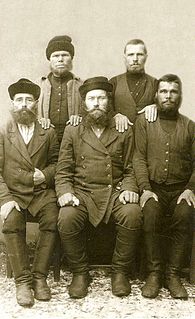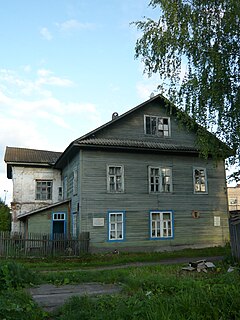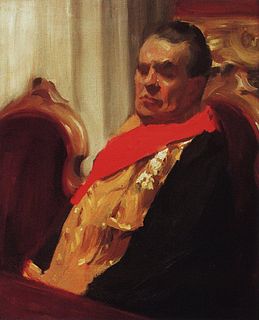Related Research Articles

The Dictionary of National Biography (DNB) is a standard work of reference on notable figures from British history, published since 1885. The updated Oxford Dictionary of National Biography (ODNB) was published on 23 September 2004 in 60 volumes and online, with 50,113 biographical articles covering 54,922 lives.

The Russian alphabet was derived from Cyrillic script for Old Church Slavonic language. Initially an old variant of the Bulgarian alphabet, it became used in the Kievan Rus' since the 10th century to write what would become the Russian language. The modern Russian alphabet consists of 33 letters. It has twenty consonants, ten vowels, a semivowel (⟨й⟩), and two modifier letters that alter pronunciation of a preceding consonant and/or a following vowel.

Pomors or Pomory are an ethnographic group descended from Russian settlers, primarily from Veliky Novgorod, living on the White Sea coasts and the territory whose southern border lies on a watershed which separates the White Sea river basin from the basins of rivers that flow south.

Sergey Ivanovich Ozhegov was a Russian lexicographer who in 1926 graduated from the Leningrad University where his teachers included Lev Shcherba and Viktor Vinogradov.

Mat is the term for vulgar, obscene, or profane language in Russian and some other Slavic language communities. The term mat derives from the Russian word for mother, a component of the key phrase "Ёб твою мать", "yob tvoyu mat'".

The Brockhaus and Efron Encyclopedic Dictionary is a comprehensive multi-volume encyclopedia in Russian. It contains 121,240 articles, 7,800 images, and 235 maps. It was published in Imperial Russia in 1890–1907, as a joint venture of Leipzig and St Petersburg publishers. The articles were written by the prominent Russian scholars of the period, such as Dmitri Mendeleev and Vladimir Solovyov. Reprints have appeared following the dissolution of the Soviet Union.
The Imperial Dictionary of the English Language: A Complete Encyclopedic Lexicon, Literary, Scientific, and Technological, edited by Rev. John Ogilvie (1797–1867), was an expansion of the 1841 second edition of Noah Webster's American Dictionary. It was published by W. G. Blackie and Co. of Scotland, 1847–1850 in two large volumes.

Georgy Alexeyevich Ushakov was a Soviet explorer of the Arctic.
Vaso (Vasily) Ivanovich Abaev was an ethnically Ossetian Soviet linguist specializing in Iranian, particularly Ossetian linguistics.
Dmitry Nikolayevich Ushakov was a Russian philologist and lexicographer.

Hrachia Acharian was an Armenian linguist, lexicographer, etymologist, and philologist.

The Russian Biographical Dictionary is a Russian-language biographical dictionary published by the Russian Historian Society edited by a collective with Alexander Polovtsov as the editor-in-chief. The dictionary was published in 25 volumes from 1896 to 1918 and considered as one of the most comprehensive Russian biographical sources for the 19th and early 20th century period.

Nikolai Aleksandrovich Nevsky was a Russian and Soviet linguist, an expert on a number of East Asian languages. He was one of the founders of the modern study of the Tangut language of the mediaeval Xi Xia Empire, the work for which he was awarded the degree of Doctor of Science in Philology during his life, and Lenin Prize posthumously. He spent most of his research career in Japan before returning to the USSR. He was arrested and executed during the Great Purge; his surviving manuscripts were published much later, starting in 1960.

The Explanatory Dictionary of the Living Great Russian Language, commonly known as Dal's Explanatory Dictionary, is a major explanatory dictionary of the Russian language. It contains about 200,000 words and 30,000 proverbs. It was collected, edited and published by academician Vladimir Ivanovich Dal, one of the most prominent Russian language lexicographers and folklore collectors of the 19th century.
Explanatory Dictionary of the Russian Language is a lexicographic group name for dictionaries. The definition "explanatory" word does not necessarily appear in the title name of these vocabularies. Among the most known explanatory dictionaries of the Russian language are:

Dictionary of the Russian Language is an explanatory dictionary of the Russian language. The first edition was published under the editorship of Ozhegov in 1949. It contained about 57,000 words; its 21st edition (1990) counted 70,000 word entries. From 1992 the dictionary is released with the names of two co-authors, Ozhegov and Shvedova.

The Etymological Dictionary of Slavic Languages: Proto-Slavic Lexical Stock is an etymological dictionary of the reconstructed Proto-Slavic lexicon. It has been continuously published since 1974 until present, in 41 volumes, making it one of the most comprehensive in the world.
Ekaterina Aleksandrovna Kniazhnina was an 18th-century Russian poet. Her surname also appears as Knyazhnina.

The chinovnik was a Russian title for a person having a rank and serving in the civil or court service. The institution of chinovniks existed de facto in the Tsardom of Russia and the Russian Empire, but until 1722 it did not have a clear structure. The de jure chinovnik institute was structured by the establishment of the Table of Ranks on February 4, 1722.
The second major was the junior staff officer rank in the Imperial Russian Army of the Russian Armed Forces of the imperial period of time, in the 18th century, and also the person wearing this rank.
References
- ↑ Словарь in the Great Soviet Encyclopedia , 1969–1978 (in Russian)